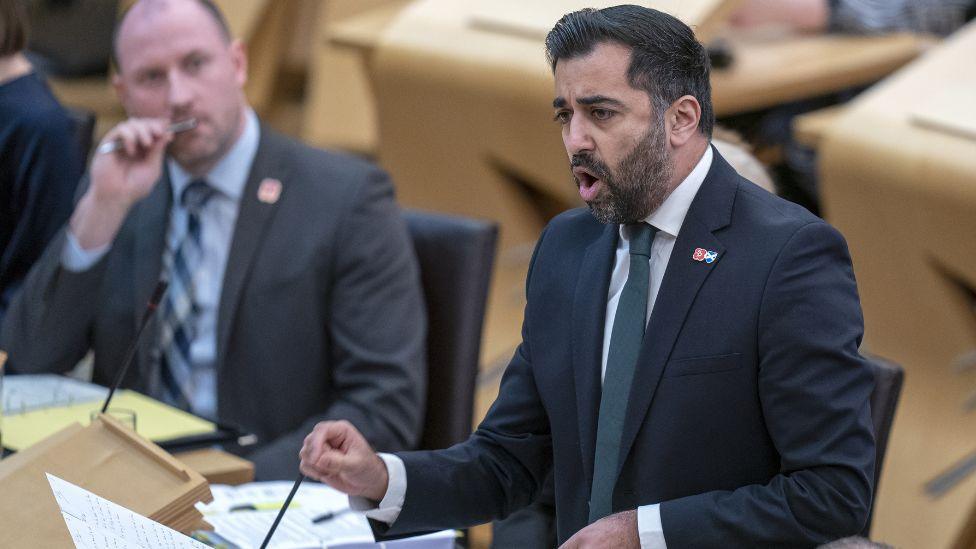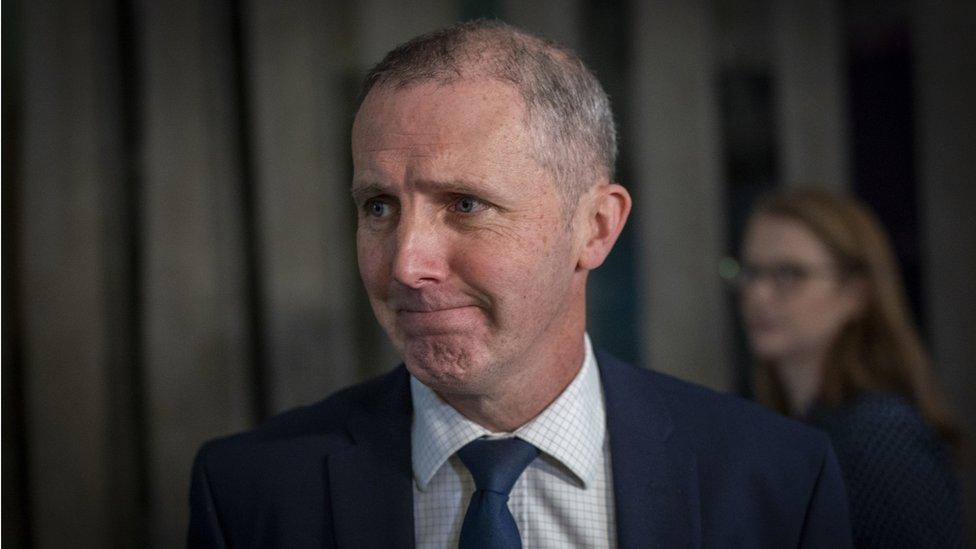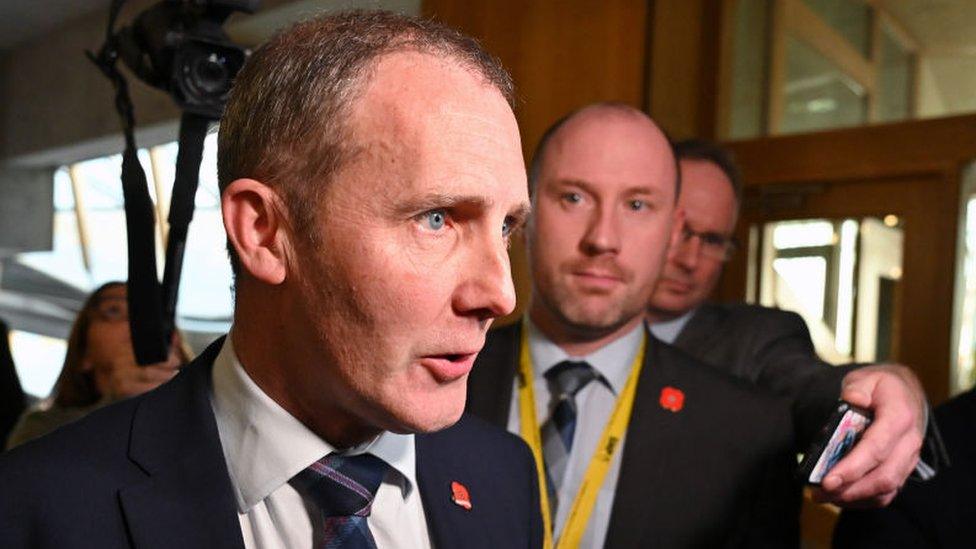Parliament to investigate Michael Matheson's £11k iPad bill
- Published
The minister, the iPad and the £11k roaming bill… explained in 85 seconds
The cross-party body in charge of the Scottish Parliament has confirmed it will investigate the health secretary's £11,000 data roaming bill.
The charge, initially paid out of the public purse, was racked up on Michael Matheson's parliamentary iPad during a holiday to Morocco almost a year ago.
Mr Matheson admitted last week that his sons had used data from the device to watch football.
He referred himself to the Scottish Parliament Corporate Body (SPCB).
The SPCB said Mr Matheson cannot self-refer but that it would look into the matter.
The health secretary, who had initially claimed the device had only been used for parliamentary and constituency business, said he welcomed the inquiry and would co-operate.
He said it "wouldn't be appropriate" to comment further.
In a statement, the SPCB said it had a "vital interest in the integrity of the members' expenses scheme, the principle that SPCB funded resources are used for parliamentary purposes and that there is public confidence in these matters".
The investigation will consider whether the £11,000 claims "were proper and met the requirements of the scheme and whether resources were used for parliamentary purposes in accordance with all SPCB policies".
The SPCB could refer Mr Matheson to the parliament's standards committee. It could also recommend the removal of Mr Matheson's entitlement to reimbursement of expenses.
The body said it would not comment further on the matter while it was being investigated.

First Minister Humza Yousaf has backed the health secretary
A £10,935.74 bill was charged to Mr Matheson's iPad following a holiday to Morocco last December with his wife and two sons.
He agreed with parliament in March that he would pay £3,000 from his own office expenses, with the rest to be paid by parliament.
He had given an assurance that the device had only been used for constituency business.
When the story was first reported two weeks ago, Mr Matheson blamed an out-of-date Sim card and agreed to pay the money back.
In a statement to parliament last week, he admitted the iPad had been used by his sons to watch football via a hotspot.
On Tuesday, Mr Matheson admitted the issue "could have been dealt with better".

What is the SPCB?
The Scottish Parliament Corporate Body, external is chaired by the presiding officer and includes four MSPs. They are currently the SNP's Christine Grahame, Claire Baker of Labour, Tory Jackson Carlaw and Maggie Chapman from the Greens.
The body's role is to ensure the parliament "has everything it needs to run" and to support MSPs "to enable them to carry out their parliamentary duties".
It meets fortnightly when parliament is in session and makes decisions on budgets, staffing, accommodation and security. It can refer MSPs the Standards, Procedures and Public Appointments Committee.
According to the code of conduct, the committee could remove "all or part" of a member's "entitlement to reimbursement of expenses under the scheme for such period and to such extent as the SPCB may specify".

Mr Matheson said the initial denial that anyone else had used the iPad was a "genuine attempt" to try to shield his family.
"I think any father would want to try to protect their children from getting drawn into a matter like that," he told BBC Scotland News.
"When it became obvious to me that I could no longer do that I had to set out the full details of it."
Meanwhile, in an interview with BBC Radio's Good Morning Scotland, Deputy First Minister Shona Robison was asked if ministers always tell the truth to the public and parliament,
She said: "I aim, and the Scottish government aims, to do that and we have been working extremely hard to make sure we provide information when we are asked to do that."

Deputy First Minister Shona Robison says Mr Matheson was trying to protect his family
But she said it was not acceptable for ministers to lie to protect their families, adding: "What I am saying is Michael Matheson set out the reasons that he was trying to protect his family, he set all that out to Parliament.
"He has said he will co-operate with any inquiry that is established."
The Scottish Conservatives have threatened to table a motion of no confidence in the health secretary if he does not hand in the iPad for further investigation.
'Taking public for fools'
At First Minister's Questions, Scottish Conservative leader Douglas Ross said Mr Matheson was "taking the public for fools".
He urged Humza Yousaf to state whether the £11,000 bill was a "legitimate expense", as he had initially claimed after the story was reported in the press.
Mr Ross said it was "beyond doubt" that the £3,000 expense claim in March was "false" because he had since admitted the device was not used solely for work.
Scottish Labour leader Anas Sarwar took aim at Ms Robison's comment that ministers "aim" to tell the truth and accused the government of fostering a "culture of secrecy and cover-up".
Mr Yousaf said the health secretary made mistakes in the handling of the issue but that he wanted to protect his sons and had agreed to pay back the fees.
The first minister told MSPs Mr Matheson was focused on his role as health secretary ahead of a "difficult" winter.


This is the first probe of its kind by the Scottish Parliamentary Corporate Body, a group that is generally tasked with maintaining the smooth running of the parliament rather than high-stakes investigations.
It's worth noting that the questions to Humza Yousaf from opposition leaders today were about the health secretary's responses to the row - whether he had told the truth to the media in the subsequent days.
That is not what the SPCB will be investigating. Their remit is fairly narrowly limited to whether the data roaming charge should have been paid for out of public funds.
And it is not clear exactly how their inquiry will work, or what the possible sanctions could be.
They could refer the matter on to the standards committee, but its investigations are usually farmed out to the Commissioner for Ethical Standards in Public Life, and take place entirely in private.
Overall it's hard to avoid the conclusion that this continues the story for today, but kicks it into the long grass thereafter.
Related topics
- Published8 February 2024

- Published17 November 2023
